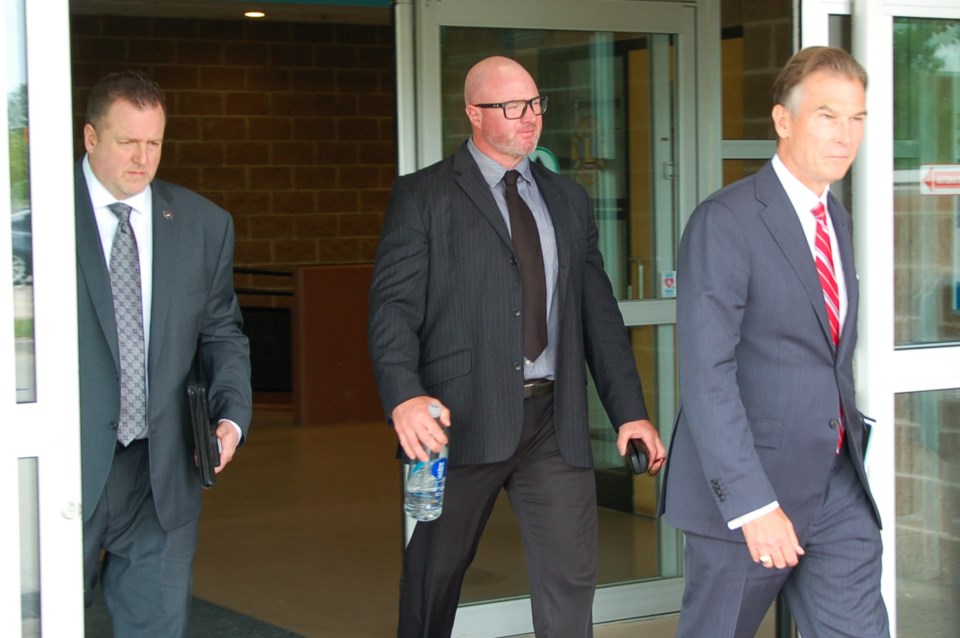You know those horror movies where the surviving characters think they’ve killed the monster, but it suddenly rises up for one last scare before the credits roll?
Apparently, trying to rid your police service of an officer who plead guilty to discreditable conduct for brutally elbowing a teen cuffed to a bed in the hospital more than six years ago is a lot like that.
This week, Const. Corey McArthur decided that he would appeal the decision of the disciplinary hearing last week that he either resign from the Guelph Police Service or be fired. The next stop is the Ontario Civilian Police Commission, and who knows when they might hear the case.
McArthur, it seems, is a glutton for not receiving punishment.
What’s the end game? To paraphrase an old adage, McArthur said he “did the crime” but he also doesn’t want to “do the time”, so is he expecting to be back out in the community in uniform? Even after all the publicity that this case has generated? Pity some other white male Guelph cop who’s also coincidentally named “McArthur” when some member of the public sees his nameplate.
The increased level of scrutiny on police following several excessive use of force incidents, especially the May 2020 murder of George Floyd in Minneapolis, often comes with the caveat from police services that these acts are the work of “a few bad apples.” But when you find a bad apple, you take it out of the bag, and rarely does anyone object because no one wants to eat something that’s apparently rotten.
That may not be an indictment on McArthur’s character because part of his defense was that he was suffering post-traumatic stress at the time due to the loss of a colleague, which happened three years previous. That might explain the 2016 assault, and another charge of assault causing bodily harm that was withdrawn in 2014, but what about that incident in 2010?
Post-traumatic stress aside, McArthur has a history of violence, but if he was still suffering the effects of PTS to the point of actionable charges of assault twice in three years, then he’s probably too susceptible to stress to be a working police officer.
One does not have a right to be a police officer, but one has a right to be relatively assured that when interacting with a police officer, while in crisis, they won’t elbow you in the face so hard they draw blood.
McArthur, it seems, believes he has a right to be a police officer. Perhaps he wants a second chance to prove he can do the job. Perhaps he wants to prove that he’s more than the headline inferences that he’s a “bad apple.” This week though there’s a new wrinkle, how much does it cost the ratepayer to fight a charge of bad appleism?
Media reports this week peg the cost at $644,570 in salary and compensation for McArthur since 2019, plus the cost in time and people for all these disciplinary hearings. Even without exact compensation figures for 2017 and 2018, it’s clear that dealing with this one officer’s conduct will cost Guelph nearly $1 million before this is over.
The costing part of this story is interesting, but the more important part is accountability. In other words, who is Constable McArthur accountable to? Who are the police accountable to generally?
In responding to calls to testify in front of the public inquiry into the use of the Emergencies Act, Premier Doug Ford said firmly in Question Period recently, “This was a policing matter, it was not a political matter and the opposition knows that. Politicians don’t direct the police.”
In a sense, Ford is correct is because you don’t want any politician directing the police; the wrong politician, with the ability to issue orders that the police feel compelled to follow, is a recipe for potential disaster.
On the other hand, Ford had no problem directing police to ticket people hanging around outside in the midst of the third wave lockdown last year. Ford also recently approved the appointment of Mario Cortellucci to the York Police Services Board, who, aside from being a wealthy donor to Ford and his political party, ran for senate in Italy as part of a far-right coalition.
But if police don’t answer to politicians, who do they answer to? Their superiors? Well, McArthur’s superiors decided that he should be charged, and then a tribunal heard months of testimony and decided that he should no longer be a police officer, but McArthur has decided not to accept their judgment and now looks to a higher authority.
At city hall, staff are answerable to supervisors, supervisors are answerable to managers, managers are answerable to council, and council is answerable to voters. Do we the people, the ones that McArthur still wants to serve and protect, get a say in this?
Perhaps we should. At the centre of the Defund the Police movement is the idea that police look out for themselves first, and the public last. Here we have an officer with a history of abusing his power, guilty by his own admission and now deemed unfit to serve by his colleagues, yet we’re still paying him to do a job he’s not doing and that his supervisors now don’t want him to do anymore.
More than six years later, we're still paying for what McArthur did at Guelph General Hospital, the question is when is he going to start paying for it?
